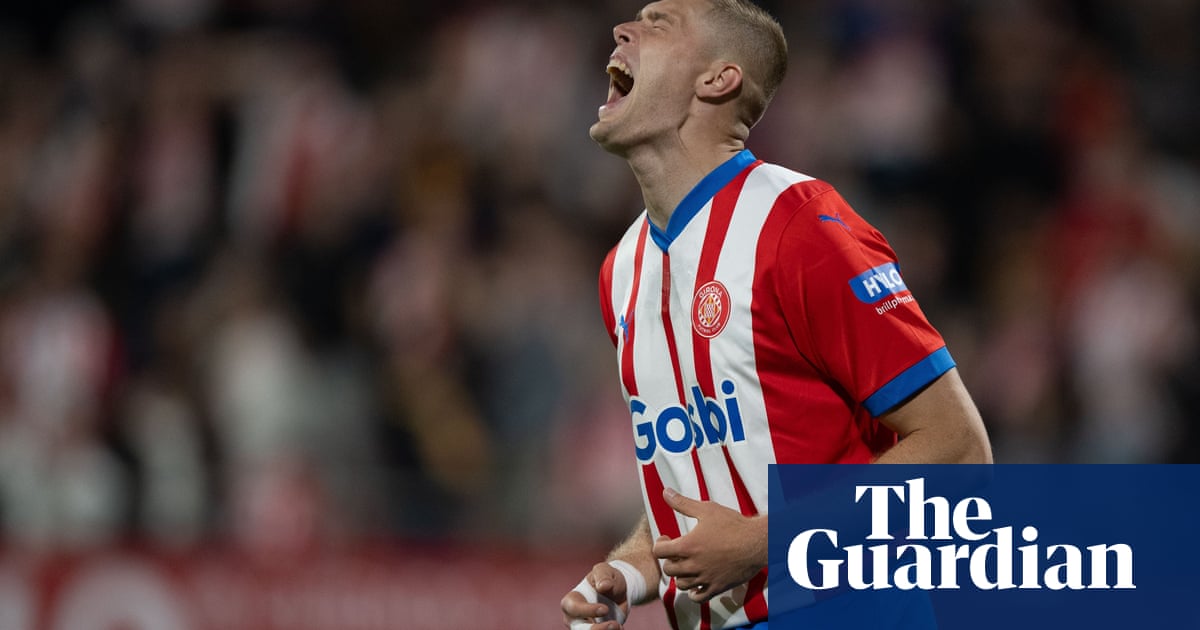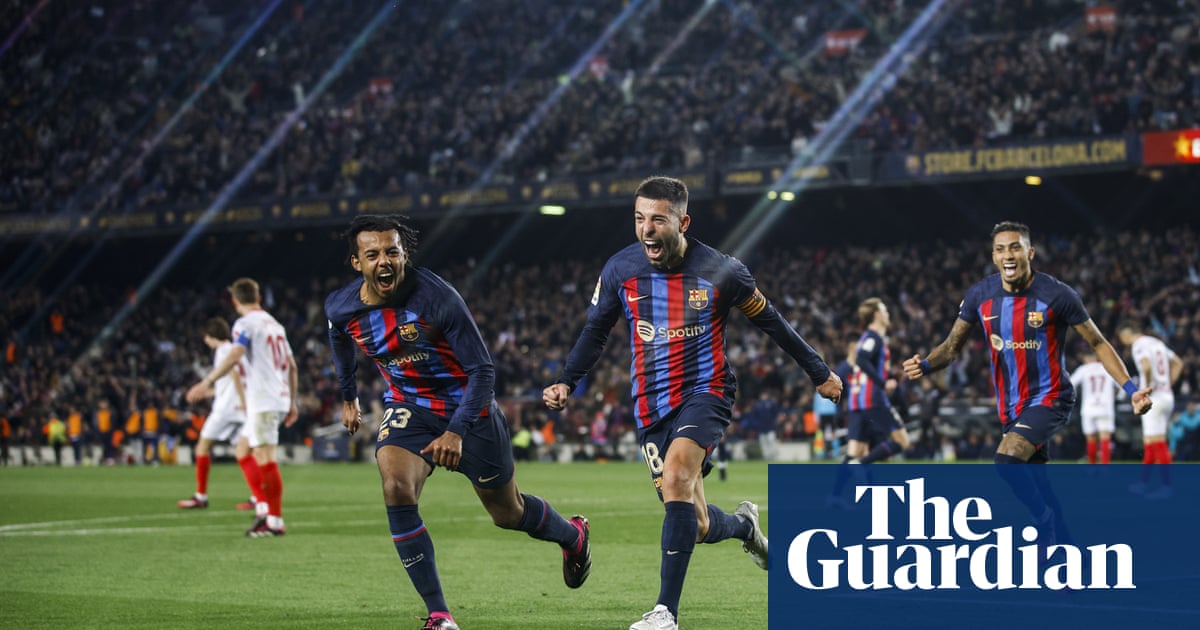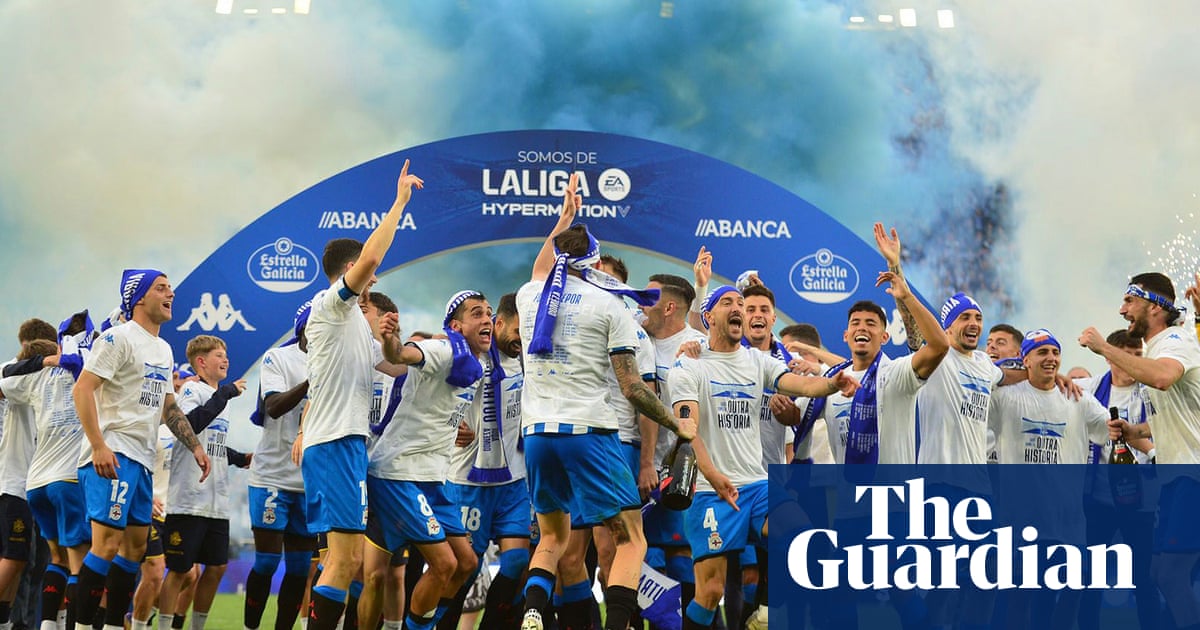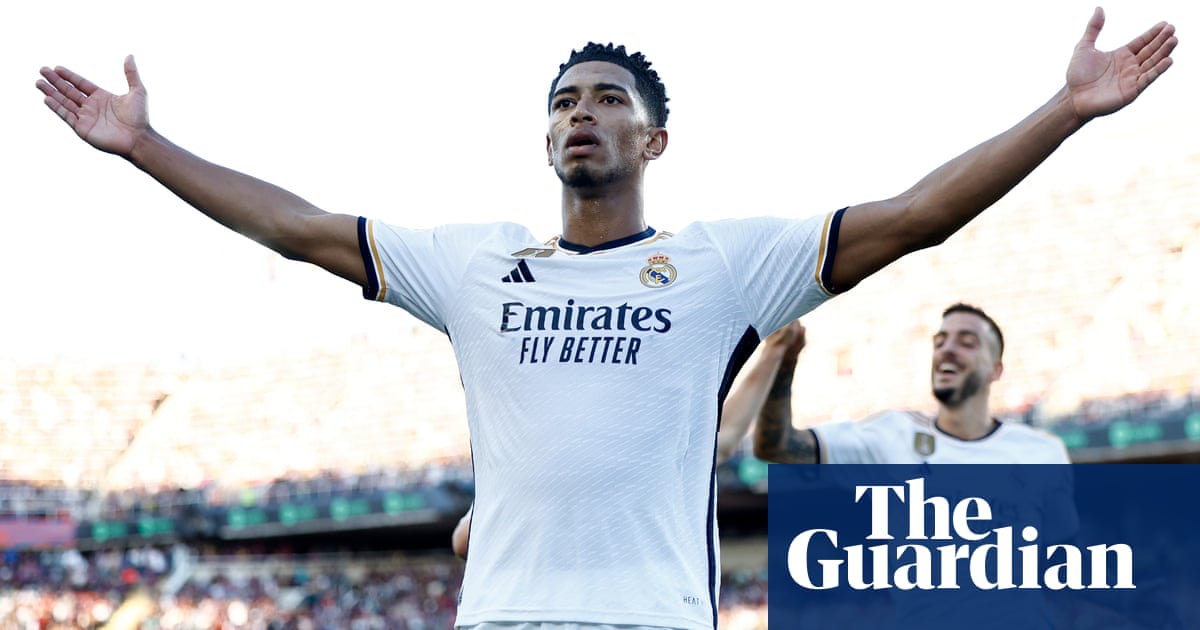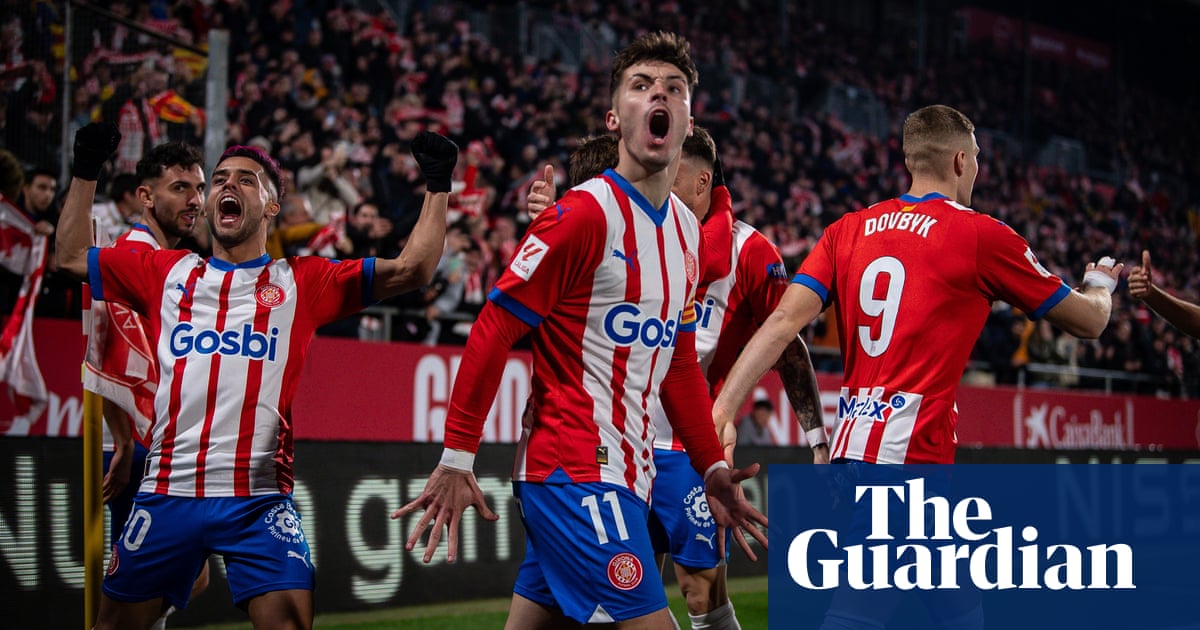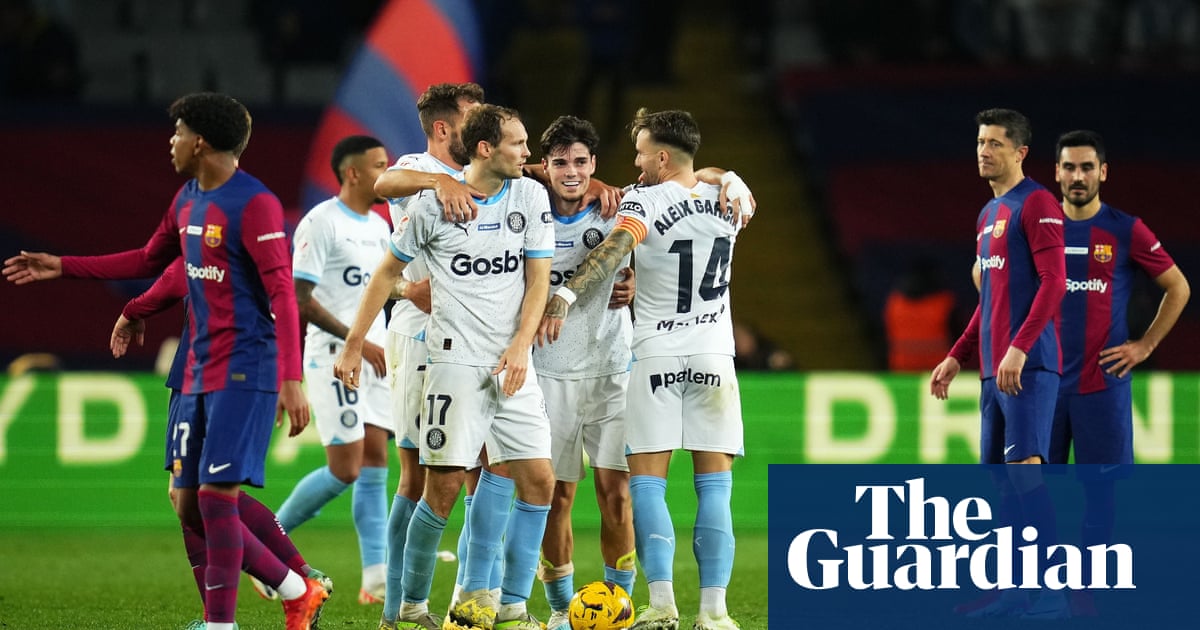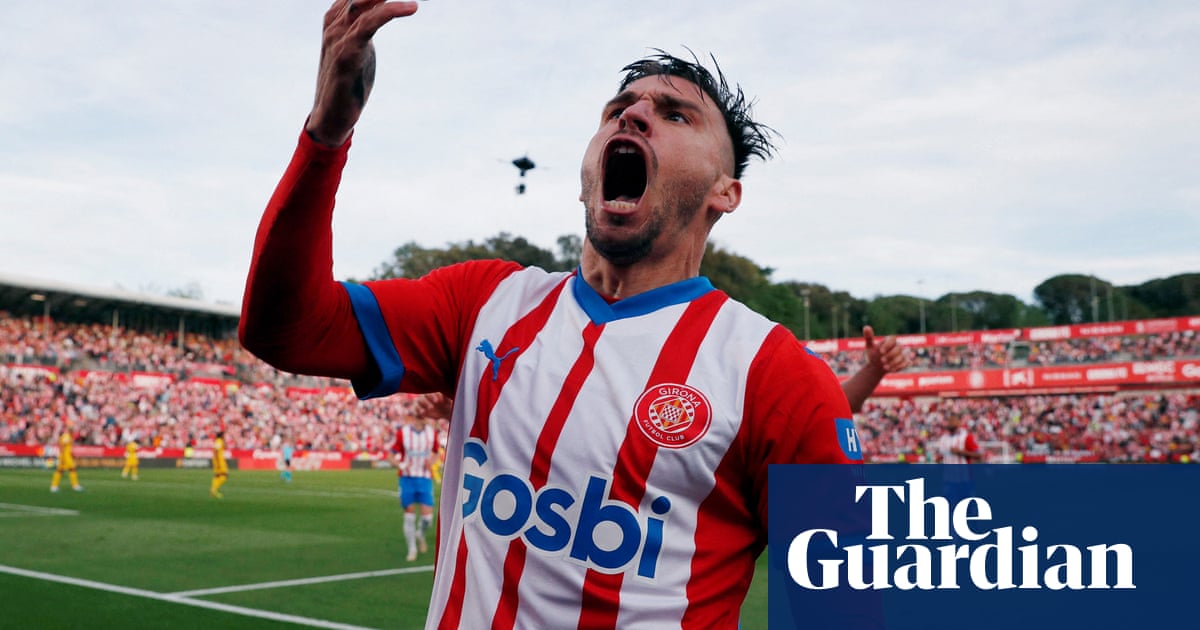
Cristian Portugués Manzanera was lying on the physio’s bench, pissed off, his manager pointing at him. It was the morning of the best day of their lives and Miguel Sanchez Muñoz, Michel II of Vallecas, Prince of all Girona, had just named the team that would go down in history. This time, Yan Couto wasn’t in it and he wasn’t happy either, so the coach took him aside and explained. Which is when the Brazilian saw his teammate getting treatment. “Look at Portu,” Michel insisted, “he scores goals and I never start him. He says: ‘You’re sinking me, but OK, I’ll just go out and score again.’”
And so it was.
“If you wanted to write a film script telling how Girona made it to the Champions League, it would be Portu’s goal,” Michel said hours later when they had been there, done that and got the T-shirts, starry football on the front, all their names on the back. When the unthinkable had happened and the team that hadn’t even been back in La Liga for two full years reached the biggest league of them all. Zadok the Priest blasting out at the place with the scaffolding stands and room for only 14,624 people. It was silly really, but that’s sport.
There were 25 minutes left, second against third in Week 34, and Girona were losing 2-1. This time Barcelona were “far superior”, the coach admitted, while his own team were “very bad”. Something had to be done, so he turned to Portu and Couto, the men he had left out now standing there the side of the pitch at Montilivi together, history calling, as David López and Viktor Tsygankov headed off in the other direction. Twenty-eight seconds later, Girona were level. Two minutes and 22 seconds after that, they led. Within 10 minutes, it was 4-2. “This is incredible,” Michel said.
It had all happened so fast. Slumping into the bench frustrated, López hardly had time to finish throwing his top and spitting something about a prostitute mother and the consecrated bread when Sergi Roberto’s wayward back-pass released Artem Dovbyk. Portu had entered the fray on 64.10; now, bombing up the right, receiving the Ukrainian’s pass, his shot crossed the line on 64.38. It was his first touch, standing there kissing the badge, opening his arms and welcoming them all in. He got his second on 66.29, and his third on 66.32, setting up Miguel Gutiérrez. He had been on the pitch for 142 seconds, but it was enough. Three touches, one goal, one assist, and one Champions League place secured.
Which was mad enough but that wasn’t the script Michel wrote, and it wasn’t done yet. On 71.05, Portu brilliantly set up Yangel Herrera, only for Marc-André ter Stegen to make a sensational save. And then, on 74.00, nine minutes and 50 seconds after coming on, he scored a goal so absurd, so ridiculous, that his manager claimed it represented everything they wanted to be, which is mighty ambitious. It was, the coach said, a goal “Portu alone imagined”, and he still had to execute it, “the goal of the league,” Michel said: a volley from the corner of the area so perfect, the curve on it so impeccable it could have traced the Earth’s orbit, been drawn for a comic. “I want people to think ‘madre mia, what Girona have done’,” Michel said. “Well, that’s what Portu did.”
What they have done is quite something; how they have done it is, too. Girona’s victory on Saturday evening finally delivered the league to Real Madrid, Carlo Ancelotti and his squad watching together 681km southwest of there; it also closed the story of this season. In the end they hadn’t been able to compete for the title, to do a Leicester, February’s defeat in Madrid maybe even liberation from the lie, and the first of five consecutive away losses that definitively ended it. But those were their only reverses since September and Michel rightly insisted, beyond “barbaric” Madrid, they have been the best.
On Saturday, they moved into second, beating Barcelona 4-2 for the second time and becoming the first team to put eight past them in a season this century. Only Madrid beat them at home, where they also scored four against Atlético, five against Sevilla, three against Betis. A team that opens the pitch so wide that Couto’s average position is pretty much out of play, who in Sávio have the man who has completed the most dribbles, in Dovbyk the man with the most goals and, in Aleix García, the man with the second most passes (behind Las Palmas’s Kirian Rodríguez), Girona have recorded four 4-2 wins, two 3-2s, a 5-2, a 5-3 and a 4-3. Only Madrid have scored more – and Michel says that’s their target now.
Girona’s other targets have already been met: first survival, done 16 weeks early, then Europe for the first time, and now this. There were still a few minutes to go, when Michel left his bench and went to kiss his wife, Lara, and his son Alex, who plays in the Madrid academy. It was done, with four weeks to spare. Someone in the stands had brought a European Cup-shaped balloon. Kids wore red and white: in a town that wasn’t traditionally a football place, where most supported Barcelona, the usual dynamic is turned on its head; children pass this passion to parents. At full time, the league’s catchiest tune was soon replaced by the Champions League anthem. T-shirts were distributed, players’ names on the back like venues on a tour.
“When I was at Rayo, there was a chant: ‘next year, Rayo-Liverpool’; I would like to go to Anfield,” Michel said after, what this means sinking in. “I would like to see the [yellow] wall at Dortmund, and historic teams here: Bayern, Inter, Milan. I can ask, can’t I?” You can, but things may have to change. Uefa won’t allow temporary stands, which would see Montilivi’s capacity dropping below 10,000, forcing them to look elsewhere.
Then of course, there’s the big blue elephant in the room. Girona are part-owned by the City Football Group (CFG), who have a 47% stake while Pere Guardiola, Pep’s brother, has a 16% holding and heads the board. The Bolivian businessman Marcelo Claure owns 35%.
This should not prove insurmountable. Red Bull managed, Uefa accepting multiclub ownership elsewhere. But Girona will have to show that City do not run the club and there will be no deals between themselves. Savinho, officially owned by fellow CFG club Troyes, has already signed for City; he cannot now return on loan, and it’s unclear what will happen with right-back Couto, who is on City’s books. There may have to be boardroom changes too, which those connected to CFG – Ingo Bank, John MacBeath and Simon Cliff – likely to leave.
That’s the regulation; then there is the unease, the feeling that City’s involvement undermines the achievement, reduces the romance. It is not easy to draw the lines, still less when it comes to players and coach personally, something uncomfortable in dismissing what they have done, judging their success fictitious, a club who made it to the top flight for the first time in 2017 and missed out in the playoffs five times now reaching the elite. This weekend brought protests from Troyes fans, relegated to the third tier in France, but Girona is not simply the other end of the scale, a team built and sustained solely by City. Not least because La Liga rules don’t allow it, although it would be naive to ignore it entirely.
Of their squad, only Couto and Sávio are drawn from the CFG network. In the summer, Girona’s salary limit was just under €52m. By contrast, Madrid’s was €727.5m, Barcelona’s €270m, Atletico’s €295m, Sevilla’s €167m. They have the 13th largest budget in primera, and record signing Dovbyk cost €7.5m. Goalkeeper Paulo Gazzaniga wasn’t a starter at Fulham. Defenders Eric García and Daly Blind weren’t wanted at Barcelona and Bayern. Sávio was playing for PSV’s B-team. Iván Martín had gone down with Alavés, while Aleix García joined in the second division having been relegated with Eibar; he’s been relegated with Girona too.
The coach, Michel, joined in 2021 having been sacked by Huesca and Rayo in the years they went down. Twelve games in, they were in the second tier’s relegation zone; within two years, they were top of the first division. Girona’s players have collectively experienced 37 relegations. Seven have gone down at Montilivi, Cristhian Stuani’s refusal to leave part of the reason he is such a hero, the man Michel vowed will wear the armband on their first European night. Portu is among them, another symbol. He did leave but was desperate to return, finally rejoining from Getafe on deadline day.
Nine months, nine minutes and 50 seconds later, his absurd performance and even more absurd goal had taken them to the Champions League, an example to them all. “He has a deep sense of belonging; all soul, all heart,” Michel said. “What he did today is incredible, the greatest expression of a footballer who feels the colours.” “I saw the other side when we were relegated,” Portu said, holding back the tears. “I felt responsible and that was a thorn in my side that I have only pulled out now. Seeing all these people, the people who were here before, knowing we’re going to the Champions League, is incredible. You couldn’t have even thought this before. There’s nothing more beautiful than writing your name into the history of the team you love.”




